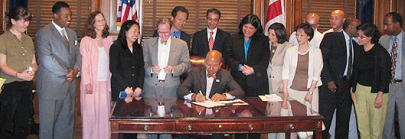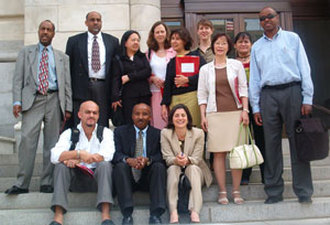History of the DC Language Access Coalition

2004: Mayor Williams signs the Language Access Act into law.
The DC Language Access Coalition is an alliance of 41 community-based and civil rights organizations that came together beginning in 2002 to ensure that all immigrants in the District of Columbia with limited or no-English proficiency (LEP/NEP) have access to public services, programs, and activities.
In 2002, the Coalition collaborated with DC City Council Member Jim Graham, the DC Office of Human Rights (OHR), the Office on Latino Affairs (OLA), the Office on Asian and Pacific Islander Affairs (OAPIA), the Office of African Affairs (OAA) and other community-based organizations (CBOs) to pass a comprehensive Language Access Act. The passage of the 2004 Language Access Act (the Act) represented a major victory for the Coalition and for LEP/NEP individuals in DC.
In 2002, the Coalition collaborated with DC City Council Member Jim Graham, the DC Office of Human Rights (OHR), the Office on Latino Affairs (OLA), the Office on Asian and Pacific Islander Affairs (OAPIA), the Office of African Affairs (OAA) and other community-based organizations (CBOs) to pass a comprehensive Language Access Act. The passage of the 2004 Language Access Act (the Act) represented a major victory for the Coalition and for LEP/NEP individuals in DC.
The Coalition's Role

The Coalition is named in the Act as a non-partisan, consultative third party organization that collaborates with the OHR, OLA, OAPIA, and other entities to monitor DC government agencies’ compliance and implementation of the Act.
Currently, the Coalition’s work falls into four predominant areas: (1) building advocacy capacity, (2) advocating for language policy improvements with the DC government, (3) developing community outreach and education programs on language access, and (4) creating internal processes to enhance the Coalition’s capacity.
Currently, the Coalition’s work falls into four predominant areas: (1) building advocacy capacity, (2) advocating for language policy improvements with the DC government, (3) developing community outreach and education programs on language access, and (4) creating internal processes to enhance the Coalition’s capacity.

